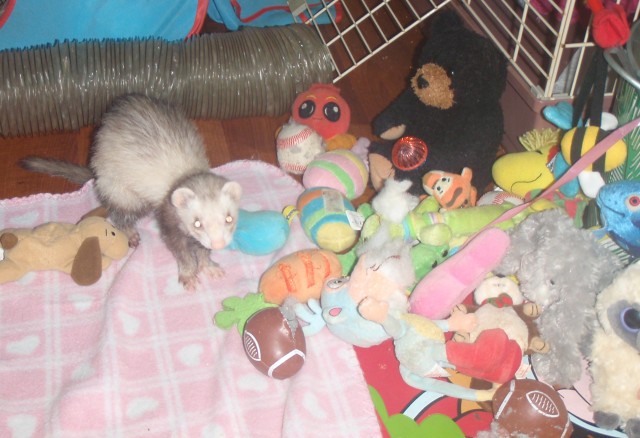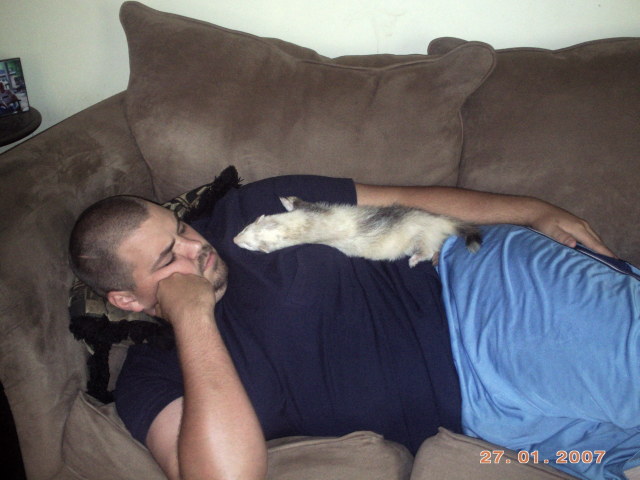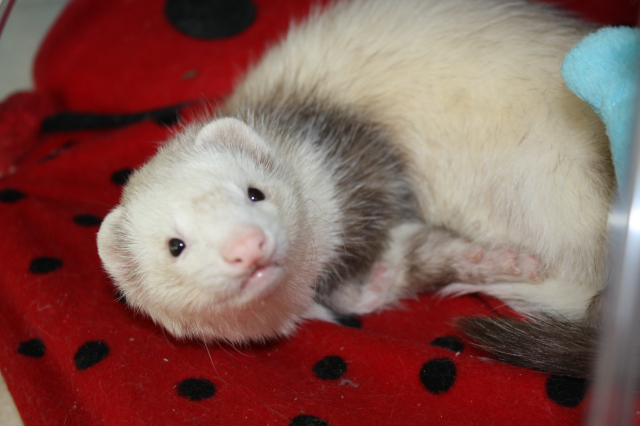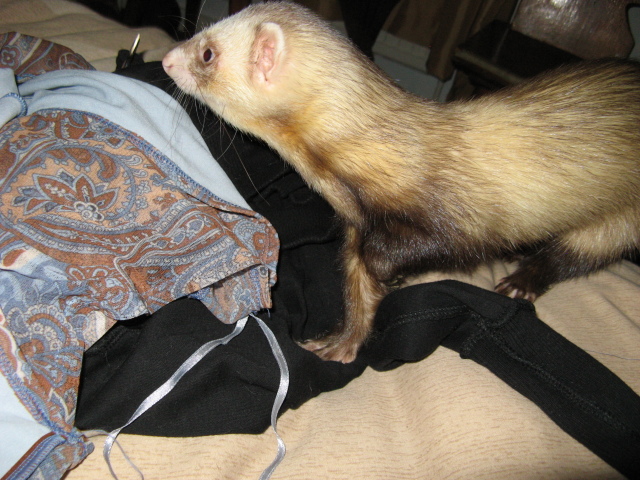QuestionHello, First and foremost I wanted to say that I have read a lot of your ? and A and Love this site Thanks so much for having it.
Now on to my few questions... First I just aquired 3 Ferrets, 1 male and 2 females. i am wondering if there is a way to tell their ages? The Male is Larger than both females by a long shot and EATS like a PIG. The lady that gave them to me told me that she has only really had them since this year towards Jan or so. and the smaller ones I think since April. Is there a way to really Age them? Also They wont sleep in the Hammocks, but they sleep on the Floor of the cage, is there a way to teach them to sleep in the hammocks? The floor has Cedar Chips to keep it smelling nice. The Male isnt going to be with us long we are going to take him to Kentucky to live with the In Laws, is there a good way to start weaning him off the two girls? THey are also all fixed. Thanks Heather
AnswerHi Heather!
Congratulations on your new family! You are embarking on a new experience that is sure to forever change your life - thats how most ferret owners feel after just a short time of owning their babies :-)
Before I address your question, I want to tell you that having cedar chips or any other kind of wood shavings in the ferret cage is not good for them. The oils in it is bad for little ferret eyes (can blind them) and the wood dust can get in their little lungs and cause real problems, so you will want to get that stuff as far away from them as possible. Ferrets are more like babies than other little critters and would much rather sleep in your cotton or flannel pajamas, baby receiving blankets (or fleece ones in wintertime). They like to have a nice dark place to hide away when they sleep, so a big sleep sack with dark fabric lining is also good. If you do hang a hammock in their cage, try putting a piece of soft clothing with your scent on it in the hammock, then when you put them in the cage, lay them on your t-shirt or whatever you chose to put in the hammy for them - they will LOVE it and they will get used to it. They possibly have never seen a hammock before, so you sill have to introduce them to it. They will enjoy it much more if it has one of your t-shirts or some soft clothing of yours they can hid their little faces in while they sleep.
There are so many things a new ferret owner needs to know right away - I highly recommend that you purchase a book called "Ferrets For DUmmies" by Kim Schilling. It's the best book out there - even for experienced ferret owners.
I am concerned that your are considering splitting up the ferrets. If they have been together in the same cage and they don't fight, they have no doubt bonded. Removing one of them would be especially bad for the one who goes out on his own and he would likely die without his friends. The girls will mourn him and they could possibly die too if the three of them have bonded (if they live in the same cage and sleep together, etc, they are bonded). It's not at all uncommon for bonded ferrets to die or stop eating and become very ill one right after the other if one of them is removed or dies. This is one reason I feel it's really important that you read as much as you possibly can about ferrets before you go much further into this commitment to them. Ferrets are so unique and different than any other pet you have ever had.
You will need to learn the common items around your house that are deadly to ferrets; you need to learn how to choose a healthy food (a BIG deal when it comes to your ferrets staying healthy and keeping vet bills down), you need to explore what toys are safe (some as cheap as a brown paper bag!) and what toys can be deadly to ferrets. There is just so much that I can't cover it all here - but it's urgent and very very crucial to your ferrets health that you read and learn about your new family members as soon as possible. The more you know about them, the better for their health and also your enjoyment - not to mention the fact that a lot of vet bills can be eliminated when a ferret owner is well-informed and prevents tragedies from happening.
It's also very important that you find a vet who cares for "exotics". If you're in a large town, this shouldn't be a problem, but in a small town, some of us even have to travel for hours to get our 'kids' to a proper vet. Dog/cat vets often just don't know about ferrets and can spell the difference between life and death over what can be simple procedures for a vet who specializes in exotics - so you will want to check into that right away. Your babies will need vaccinations; you need to learn to keep their little toenails trimmed about every 10 days for their own safety (they can catch on fabrics or toys and rip toes off, and bleed like crazy.) They need hairball treatment regularly; they can get intestinal blockages and die in less than 24 hours if you don't know the symptoms to look for. These are the kinds of things I am talking about when I say there are so MANY things you are going to need to know right away. Once again, the book "Ferrets For Dummies" by Kim Schilling is considered the "Bible" for ferret owners, new and experienced ones.
Now, as far as your question - you didn't think I was going to get there did you? :-) It usually requires an exotics vet to really tell how old a ferret is. But I will tell you as much as I know. Very young ferrets have 'baby teeth' and adult teeth, and they can tell by which teeth have come in approximately how old the ferret is. Once a ferret reaches maturity at about age 7 months, they start gauging age by the opacity of their teeth. As a ferret ages, starting at the tip of the teeth (especially the canines, the big sharp ones in front) the tooth begins to become opaque. The older the ferret, the more the opacity moves up the canines towards the gumline. In a very old ferret, the canines will be completely opaque. Also, over time (and sometimes a very short time if the ferret is on a bad food) they also get calcium deposits on their teeth that help give away possible age. A ferret who has been eating a food too high in sugar and/or not enough protein can *look* like he is 6 or 7 years old, but after his teeth are cleaned, it can reveal nice white teeth underneath, and a much younger age - bad foods can rot their teeth and sugar is a 'no no'. Aging a ferret isn't an exact science, but a good ferret vet can give you a really good idea of their age by looking at their teeth.
Let's think about finding you a good ferret vet. You can go to http://www.ferretcentral.org and click on "Resources", then on "U.S. Vets". The vets are listed according to state, then city. Hopefully you can find one near you. There are other sites too, so if you don't find one near you, write to me again and tell me what city and state you are in and I can research it deeper. It's really important that you get established with an exotics vet early on. There is also a LOT of other information about ferret ownership on the Ferret Central website and I hope you'll look around and read the FAQ's on the site - that's a good start for a new ferret owner until you can get the Ferrets for Dummies book. There are also a few other websites that are especially good: http://www.miamiferret.org and http://www.ferretuniverse.com . If you will click the links on those websites you can get all kinds of good general information.
If the age of your ferrets is unknown, you must consider that fact that you are at LEAST the second owner - maybe even the third or fourth - or who knows? Ferrets are very social creatures and they bond with their owners very strongly if they are loved, played with daily and talked to regularly. Your little ones no doubt are probably wondering why everyone keeps shuffling them to another new home. I seriously hope you will reconsider rehoming the little male off by himself in yet another strange place. I would have very very strong concerns about what effect that would have on the health and emotional well-being of all three ferrets. The only thing that is constant in their little lives on a daily basis has been each other - to remove one by himself and take him to yet another strange place - even if he has a LOT of love, the chances of him surviving are far less than if the three are kept together. A lot has been studied and written about this and the concensus is that bonded groups should always be kept together. Stress in ferrets usually shows itself in the form of depression and/or disease. There are many many ferrets in shelters who would LOVE the chance to go to that other home you were planning to send the little boy to - I hope those folks will check into adopting from a ferret shelter near them instead of breaking the bond your babies have with each other.
I hate to sound like I'm preaching, but it's really important to their health over the long term that they experience a secure, loving home environment. Things like adrenal disease can start early in a ferrets life if he/she has undergone emotional stress and it sounds like your kids have already been thru a lot with multiple owners and homes.
Hopefully this has been helpful to you. I hope you will follow up and get your kids to a vet for their vaccinations (be sure to read up before taking them - they get distemper and rabies but should *never* have both shots on the same day and should be 'pre-treated' with a benadryl shot before receiving any vaccination, as it's not terribly uncommon for a ferret to have a reaction to vaccinations and die right there on the spot if not pre-treated and in the hands of a good exotics vet who knows what to do if a reaction happens). Just knowing these kinds of things will make you a better ferret owner. The more you know, the more likely your babies will be with you for years to come and will enjoy healthy, happy lives. A happy, healthy ferret brings more joy than just about anything else on earth IMHO. :-) They are social creatures and depend on daily interractions with their human; can become depressed if they are just left in the cage. They need to be out and running around (in a well ferretproofed home - or at least one room) for at least 2 to 3 hours a day, and have *safe* toys to play with (as simple as a cardboard box or two and some crumpled up paper tossed about for them to attack :-) Some baby toys are also great for ferrets, but avoid anything with rubber - that's a common cause of intestinal blockages because ferrets like to eat it for some reason. There are ideas for playtime galore on both those websites I gave you and lots of information you will need to know to keep your babies safe and healthy.
Obviously I can't write everything here that you need to know - and I so hope that you will follow up and read up on these amazing little critters. Thanks so much for coming to this site and giving me the opportunity to get you started in the right direction. I wish you and your babies the very best of luck and hope you won't hesitate to ask me further questions of any kind at any time. Also, there are many ferret groups online and they are also a great source of information. One is called Norwegian Ferret Family (no, they aren't really in Norway LOL, they are in the U.S.) and they welcome new ferret owners and can answer just about any question you can think of. Their website has a LOT of information on ferret care also, and there are some great people who are generous in sharing their experience.
Best of luck - don't hesitate to write again! Please hug those little babies for me - it sounds like they have had a rough start in life and I hope they have found their "forever home" with you.
jacquie

 My 7 yr old ferret is obsessively chewing her toys
Question
Cecilia and her babies
Hi,
My ferret Ce
My 7 yr old ferret is obsessively chewing her toys
Question
Cecilia and her babies
Hi,
My ferret Ce
 Crazy Ferret
Question
Tweedle and Drew
My son brought home a ferret
Crazy Ferret
Question
Tweedle and Drew
My son brought home a ferret
 Shes so nippy
Question
Delilah
My boyfriend got me the cutest
Shes so nippy
Question
Delilah
My boyfriend got me the cutest
 I think my ferret is to thin?
Question
Photo of Ferret
Hi
I think my ferret is to th
I think my ferret is to thin?
Question
Photo of Ferret
Hi
I think my ferret is to th
 New ferret
Question
Franko the ferret
Hello,
I just boug
New ferret
Question
Franko the ferret
Hello,
I just boug